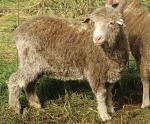Ugly sheep may hold key to world fibre market
 Animal Science Animal Science
University of Adelaide researchers and colleagues from the South Australian Research and Development Institute (SARDI) believe Australia's ugliest merino lambs may hold the key to securing Australia's $2.8 billion wool industry and challenging the dominance of synthetic fibres in world markets. They are calling on sheep producers to watch out for 'xtreme' sheep with unusual wool that may help unlock the genetic library which points to superior wool quality. The University of Adelaide's Professor Phil Hynd says these lambs are usually culled because they may have uneven wool, strange fibres, clumps of wool that fall out, bare patches, no wool, unusual crimp, extra-lustrous wool, or even highly wrinkled skin. "These lambs, typically viewed as worthless, are in fact highly valuable to the industry, because one of the most efficient ways to identify the genes that impact on certain wool traits is to study animals that have rare or extreme features," said Professor Hynd, who is Director of Roseworthy Campus. He heads the wool program of the joint Australian Wool Innovation Limited and Meat and Livestock Australia initiative, the Sheep Genomics Program. "When something goes really wrong with the genes, it is the most powerful indicator about where to look to identify the genes that can - paradoxically - make things go really right. "It's as though in a mirage of thousands of genes, we can suddenly see a flag pointing to those that are critical to wool follicle formation and fibre synthesis. "Ultimately, through the latest DNA-based technology, it's the ugly sheep that will help us make quantum leaps to advance the qualities of Australian merino wool to make it more stretchy, less scratchy, shinier and easier to spin, and to compete better against synthetic fibres." Professor Hynd said that it was estimated that, among the national merino flock, about 100 'xtreme' lambs born this autumn will exhibit the naturally occurring random mutations that cause unusual fleeces. "Currently the wool industry is making small, incremental improvements to wool quality - about 1% a year. The development of studying unusual sheep could lead to dramatic improvements in genetic gain and secure a healthy future for the Australian wool industry."
|





